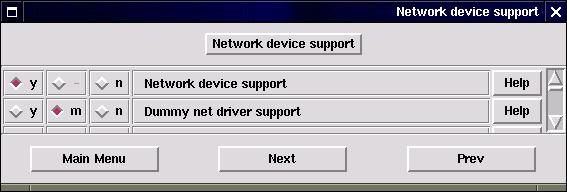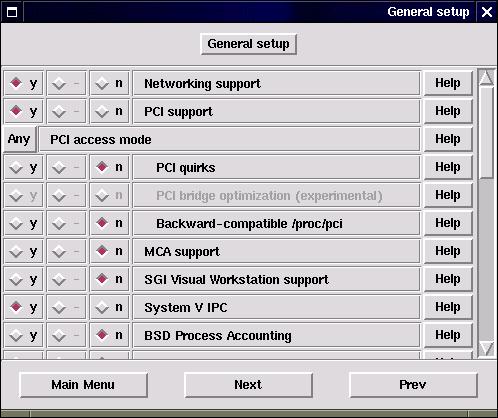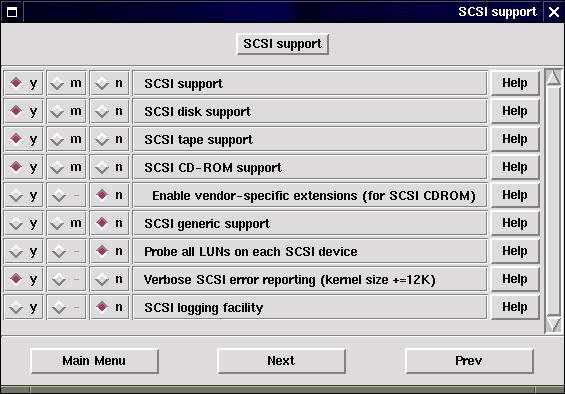
How compile a Kernel

How compile a Kernel |
The
goal of this section is not to make a detailed explanation of the functions
of the Kernel but a method to compile its Kernel in order to choose the
most interesting functions.
| First stage |
Let
us check that the system have the utilities necessary to the compilation
of the Kernel.
|
|
|
| gcc -v ( or type gcc ) | egcs-1.1.2-x.i386.rpm
( x relate to a value of the version of the package )
cpp-1.1.x.i386.rpm |
| make -v ( or type make ) | make-3.77.x.i386.rpm ( x relate to a value of the version of the package ) |
| automake --version ( or type automake ) | automake-1.4.x.noarch.rpm ( x relate to a value of the version of the package ) |
| type as86 | dev86-0.14.x.i386.rpm ( x relate to a value of the version of the package ) |
| patch -v ( or type patch ) | patch-2.x.i386.rpm ( x relate to a value of the version of the package ) |
in case of make xconfig or make menuconfig
|
|
|
| ls -l /usr/include/strings.h | glibc-devel-2.1.x.i386.rpm ( x relate to a value of the version of the package ) |
| ls -l /usr/include/curses.h | ncurses-devel-x.i386.rpm ( x relate to a value of the version of the package ) |
| Second stage |
Let us check that the sources of the Kernel are present on the distribution:
|
|
|
| rpm -qiv kernel-source | kernel-source-2.2.xy.i386.rpm |
| rpm -qiv modutils | .modutils-2.3.9-6.i386.rpm ( recommended ) |
or
well
if
you wish to install a new Kernel (different from the sources from the distribution)
- copy the file of Kernel ( ftp or Cd-Rom)
ex: ftp://ftp.kernel.org/pub/linux/kernel/v2.2/linux-2.2.14.tar.gz
- move in the tree structure: cd /usr/src
- suppression of the symbolic link : rm linux
- creation of the directory source: mkdir linux-N°Kernel (ex: mkdir linux-2.2.14)
- creation of the symbolic link : ln -s linux-2.2.14 linux
- decompression of the file: tar xfvz /somewhere/linux-2.2.14.tar.gz
In
the case of Proliant 2000 and Kernel 2.2.12, it is not integrated the card
and chipset SIM710. You need patche the Kernel with the file sim710-991111.diff.bz2
(to be
downloaded here).
- copy it in /usr/src: cp /somewhere/sim710-991111.diff.bz2 /usr/src
- move in the directory:cd /usr/src
- decompression of the patch: bzip2 sim710-991111.diff.bz2
- application of the patch:patch -p0 < sim710-991111.diff
| Third stage |
Now we will configure the Kernel:
- move in the directory: cd /usr/src/linux
there are three possible commands:
make config : in the case of a dumb terminal not managing neither color, nor graphics
make menuconfig : in the case of a terminal text, managing the colors
make xconfig : can be executed only on system X.
in
the last case here the screen which will see appear:

The various sections propose options which will be three:
y: option directly integrated into KernelSome Sections are significant in the case of our Compaq Proliant 2000.
n: option desactivated
m: option integrated in the form of external module
section Processor type and features

section Loadable Module Support

section General Setup

section Networking

section SCSI Support

section SCSI low level drivers

section mice

These
choices are significant but can be modified according to needs.
You
can now make " Save and Exit ".
The
options are stored in the file /usr/src/linux/.config
You
can download the version of which I was useful myself
| Config file for Kernel 2.2.12-20 | 2.2.12 here (rename it ".config") |
| Config file for Kernel 2.2.14-5.0 | 2.2.14 here (rename it ".config") |
| Config file for BOOT 2.2.12-20 | BOOT 2.2.12 here (rename it ".config") |
| Config file for BOOT 2.2.14-5.0 | BOOT 2.2.14 here (rename it ".config") |
| Fourth stage |
Compilation itself (move in the directory: cd /usr/src/linux)
There are two methods:
| First method |
make install: the command determines the dependences,CAUTION: In this case, edit the file /etc/lilo.conf before and to replace:
compiles the Kernel, automatically creates the links in the directory /boot like the command /sbin/installkernel
( ex: /sbin/installkernel 2.2.12-20 /usr/src/linux/arch/i386/boot/bzImage /usr/src/linux/System.map)
and carry out the command lilo - v.
image=/boot/vmlinuz-2.2.12-20
by
image=/boot/vmlinuz
| Second method |
make dep : to determine the dependences
make clean : to remove the old file-objects
make bzImage : built the Kernel and stores it in /usr/src/linux/arch/i386/boot
(NB:
In the case of the diskette of Boot-Redhat or Rescue-Redhat, copy the file
/usr/src/linux/arch/i386/boot/bzImage from the diskette and rename
it vmlinuz)
type the commands to remake the links of Boot:
- mv /boot/vmlinuz-2.2.12-20 /boot/vmlinuz.old
- mv /boot/System.map-2.2.12-20 /boot/System.map.old
- cat /usr/src/linux/arch/i386/boot/bzImage > /boot/vmlinuz-2.2.14
- cp /usr/src/linux/System.map /boot/System.map-2.2.14
- ln -fs vmlinuz-2.2.14 /boot/vmlinuz
- ln -fs System.map-2.2.14 /boot/System.mapEdit the file /etc/lilo.conf before and to replace:
image=/boot/vmlinuz-2.2.12-20- /sbin/lilo - v
by
image=/boot/vmlinuz
| Fifth stage |
Construction
of the modules:
make modules
Installation
of the modules:make modules_install
You can also use " linuxconf " to edit lilo.conf easily in order to start on various versions of the Kernel.
It any more but does not remain you to reboot (while having taken the precaution to have a diskette rescue for 6.0 or for 6.1 or for 6.2 under the hand).
Come
back